- Home
- Julian Barnes
Cross Channel Page 12
Cross Channel Read online
Page 12
At first conversions came quickly among the old, the feeble, the solitary, and those infants who had been forcibly beguiled by gaudy display. But after a few weeks the number of abjurations diminished. This was often the pattern, and it was known that the dragons frequently gave way to excesses in order that the conversions continue.
When the tallage had first been announced, there were those who had sought to flee, who had heard that it was possible to reach St Nazaire and discover the promised land elsewhere. Two families had left the town in this manner, whereupon members of the cult had been instructed by the Intendant to pull down and destroy with fire the houses they had left behind, whereupon the unpaid tallage was not forgotten but transferred to those who remained. It was always the way. When a heretic Converted to the King’s religion, his tallage was divided among the community of heretics, and their tax thus became even larger as their means of payment diminished. This led some to despair; but others, having lost everything, were made the more determined not to lose that faith on whose account they had already lost everything. Thus the booted missionaries met with more resistance as their work continued. This too was known and expected.
It was not long after Pierre Chaigne’s instruments had been sold that Anne Rouget, his mother’s sister, fell into sickness and became the first member of the family to abjure. When the dragons saw that she was weak and feverish, they yielded the bed to her and slept upon the floor. This chivalry was deliberate, for no sooner was she positioned in the bed than the soldiers declared her sickening unto death and summoned the priest of the King’s religion. It was established by royal ordinance that when a protestant heretic was dying, the priest had the right to visit the deathbed and offer the suffering one an opportunity to return in death to the Holy Mother Church. This visit, which the family were forbidden to prevent, was to take place in the presence of a magistrate; and the priest was not allowed to use any duress when attempting to obtain a conversion. However, such terms and conditions were not always strictly followed. The magistrate being occupied elsewhere, the priest was accompanied into the Chaigne household by the officer of the dragons. The family was expelled into the day’s heat, two dragons guarded the door, and at the end of six hours Anne Rouget had been received back into the Church where she had spent the first thirty years of her life. The priest departed with satisfaction, and that night the soldiers reclaimed the bed as their own and returned Anne Rouget to the floor.
‘Why?’ asked Pierre Chaigne.
‘Leave me in peace,’ replied Anne Rouget.
‘Why?’
‘One or the other is true.’
She did not speak beyond that, and died two days later, though whether from her fever, her despair or her apostasy Pierre Chaigne was unable to determine.
The child Daniel, aged nine, was the next to abjure. He was taken to the church of the King’s religion, where it was explained to him that Anne Rouget, who had done the service of a mother for him, was awaiting him in Heaven, and that he would surely see her again one day unless he clung to heresy and chose to burn in Hell. Then he was shown fine vestments and the gilt reliquary containing the little finger of Saint Boniface; he smelt the incense and examined the monsters carved between the choir-stalls - monsters which he would doubtless meet in person if he freely chose to burn in Hell. And the following Sunday, during the Mass, Daniel Chaigne publicly abjured the cult of the temple. His conversion was received with great and impressive solemnity, and afterwards he was much petted by the women of the King’s religion. The following Sunday Pierre Chaigne and his elder son tried to prevent the dragons taking Daniel Chaigne to the Mass; they were beaten and the boy was taken none the less. He did not return, and Pierre Chaigne was informed by the priest that he had been placed beyond the reach of treason in the Jesuit College on the other side of the Montagne Noire, and that his education there would be at the expense of the family until such time as they chose to repudiate their heresy.
Only the obstinate ones now remained among the heretics. It was at this point that the Intendant named as Collector of the Tallage the leading Protestant landowner of the region, Pierre Allonneau, sieur de Beaulieu, fermier de Coutaud. It became his legal duty instantly to pay the accumulated tax owed by all members of the cult since the tallage was announced. This he was unable to do, but being reduced at once to ruin, was no longer able to help in secrecy the obstinate ones.
The three dragons had been within the Chaigne household for two months. All the chickens and both the pigs had been eaten; all but a little of the furniture had been burnt; Pierre Chaigne’s timber had been consumed with the exception of a rough pile of worthless lumber at the back of his shed. Others in the town who might have supported the family were now equally destitute. Each day Pierre Chaigne and his son Henri were obliged to traverse the woods and fields to obtain food. Two of the soldiers came with them, leaving the officer to guard Marthe. It was difficult to find enough food to satisfy six mouths, and the two dragons offered no assistance in the chase of a rabbit or the search for mushrooms. When there was not enough food for the soldiers to eat until they belched, the Chaigne family went hungry.
It was on their return from one of these daily expeditions that Pierre Chaigne and Henri Chaigne discovered that the officer had taken Marthe Chaigne, aged thirteen, into the bed with him. This sight caused Pierre Chaigne much anger and despair; only his religion prevented him from seeking that very same night the death of the officer.
The following day the officer chose to accompany the two heretics on the search for food, and one of the ordinary soldiers stayed behind to guard Marthe. This soldier also took her into the bed with him. No explanation was offered, and none was required. Marthe Chaigne refused to talk to her father or her brother about what had been done.
After nine days of seeing his sister taken as a whore, Henri Chaigne abjured his faith. But this action did not prevent the dragons from continuing to take his sister as a whore. Consequently, at the celebration of Mass the following Sunday, Henri Chaigne spat out of his mouth the holy wafer and the holy wine he had received from the priest. For this blasphemy against the body and blood of Our Lord, Henri Chaigne was duly tried by the Bishop’s court, condemned to death and handed over to the soldiers who burnt him with fire.
Afterwards, the three soldiers separated Pierre Chaigne and his daughter, not permitting them to talk to one another. Marthe kept the house and whored for the dragons; her father hunted for nourishment and cut wood in the forest, since the autumn air was now turning cold. Pierre Chaigne, who had suffered greatly, was resolved to resist apostasy even unto death. His daughter was equally certain in her faith, and underwent her daily ordeal with the fortitude of a martyr.
One morning, after the officer had taken her into the bed with him but treated her less roughly for once, she received a brutal surprise. The officer had been accustomed to talk to her in the rough language of the north while he used her as a whore, to shout words and afterwards to mutter quietly. She had become familiar with this, and at times it helped her bear the suffering more easily, for she was able to imagine that the man who spoke these words from the north was himself as distant as the north.
Now, as he still lay athwart her, he said, ‘You are brave, young girl.’
It took her a moment to realise that he had spoken her own language. He raised himself on an elbow and shunted off her. ‘I admire that,’ he went on, still in her language, ‘and so I want to spare you further suffering.’
‘You speak our tongue.’
‘Yes.’
‘So you have understood what we have said in the house since you came here?’
‘Yes.’
‘And the others too?’
‘We have been in your country many years.’
Marthe Chaigne was silent. She remembered what her brother Henri had openly said about the dragons, and about the priest of the King’s religion. Her father had revealed where the cult was to be celebrated, little suspecting the consequences
. She herself had uttered words of hatred.
‘And because I wish to spare you suffering,’ the officer continued, ‘I shall explain what will happen.’
What could happen? More pain of this kind. Worse. Torture. Death. No doubt. But then Paradise, surely.
‘What will happen is that you will become with child. And then we shall testify that your father used you as a whore in our presence. And you will be taken before the court, your father and you, and there condemned. You will be burnt to death, you and your father, as also will be the child of this incestuous union within you.’
The soldier paused, and allowed the rigid girl fully to understand what he had said. ‘You will abjure. You will abjure, and thereby you will save your father’s life.’
‘My father would rather die.’
‘Your father does not have the choice. Only you have the choice whether your father dies or not. So you will abjure.’
Marthe Chaigne lay motionless in the bed. The soldier got up, adjusted his clothing, and sat at the table waiting for her to agree. He was wise enough in his profession not to add unnecessary words.
Eventually the girl said, ‘Where do you come from?’
The soldier laughed at the unexpectedness of the question. ‘From the north.’
‘Where? Where?’
‘A country called Ireland.’
‘Where is that?’
‘Beyond the water. Near to England.’
‘Where is that?’
‘Beyond the water too. In the north.’
The girl in the bed remained with her head turned away from the soldier. ‘And why do you come so far to persecute us?’
‘You are heretics. Your heresy endangers the Holy Mother Church. All, everywhere, have a duty to defend Her.’
‘Thirty pieces of silver.’
The officer appeared close to anger, but kept in mind the purpose of the day.
‘If you have not heard of England then you have not heard of Cromwell.’
‘Who is he?’
‘He is dead now.’
‘Is he your King? Did he recruit you? To come here and persecute us?’
‘No. On the contrary.’ The soldier began to remember things it did no good to remember, things which had fixed his life for ever, many years ago. Childhood, its sights, and its terrifying sounds. The harsh voices of England. ‘Yes, I suppose he did. He recruited me, you could say.’
‘Then I curse his name and all his family.’
The officer sighed. Where could he begin? There was so much to unravel, and he was an old man now, past forty. The child did not even know where England was. Where could he begin? ‘Yes,’ said the officer wearily. ‘You curse his name. I curse his name too. We both curse his name. And on Sunday you will abjure.’
That Sunday, while incense stung her nostrils and her eye was assailed by the whorish colours of the King’s religion, Marthe Chaigne, aged thirteen, her heart burdened by the sorrow she was causing her father and by the knowledge that she would never be permitted to explain, abjured her faith. She made a mark on the register beside her name, and the officer of the dragons signed as witness. After he had signed, he looked up at the priest and said, in his own language, ‘What matter the road provided it lead to Paradise?’
Marthe Chaigne was taken that day to the Union Chrétienne on the other side of the Montagne Noire, where she would be educated by the good sisters. The cost of her education would be added to the tallage owed by Pierre Chaigne.
The following week the dragons left the town. The heretics had been reduced in number from one hundred and seventy-six to eight. There were always the obstinate ones, but experience had shown that when they were greatly outnumbered they had little influence and ended their lives in bitterness and despair. The dragons were to move south and start their work in a new place.
The eight obstinate ones were burdened by the tallage of those who had converted, with the cost of educating their own children as Catholics, and with numerous additional imposts. By ordinance they were forbidden from practising their trade or from hiring out their labour to members of the King’s religion. They were also forbidden from abandoning their homes and seeking the promised land elsewhere.
Two nights after the dragons left, Pierre Chaigne, carpenter, widower, returned to his workshed. He took down the lantern he had made and slid out three of its glass panels. From the pile of discarded lumber too contemptible even to be burnt by the soldiers he uncovered the three oblongs of thin beechwood. He pushed them gently between the runners sticky with mutton-fat. Then he lit the candle and set the hood back in place. Lacking three-quarters of its glass, the instrument did not illuminate universally. But it gave a brighter, purer light for the direction in which it was pointed. Pierre Chaigne, carpenter, widower, would follow that light to the end of its journey. He walked to the door of his shed, lifted the latch, and set off into the cold night. The yellow beam of his lamp reached tremblingly towards the forest, where the other obstinate ones waited for him to join them in prayer.
BRAMBILLA
TELL YOU HOW I learned to descend. Mr Douglas, back then, kept telling me I rode like a postman. He had this old machine as well as his racer, stand-up handlebars, almost a shopping-basket on the front, and sometimes he’d go out on it with me. I thought he was just doing it to put me down, but he was a canny fellow, he was showing me how far I had to go. I mean, he wouldn’t keep up with me all day, but he’d do it for a stretch, then send me off over the hills by myself. Uphill, downhill, story of my life.
So one day I thought training was over and he started towing me up Mount Moran. Just kept pedalling, mouth shut, setting the pace, with me in behind. We’d been out seven, eight hours already and the sun was turning all orange over the flats and I really didn’t see the point because he wasn’t hurting me, I was sitting on his back wheel and no problem. We’d gone up this whole load of big loops and he stops at the side of the road and we’re looking into the sun and he says, ‘Right, Andy, I’m going to teach you how to descend.’ And - this is the scary bit - he takes out this little spanner and unscrews his brake blocks and just hands them to me. ‘All you have to do is keep up,’ he says, ‘and I’ll buy the drinks.’ So he pushes off while I’m stowing his blocks, and I had to follow him, and at first I thought well if he isn’t using brakes I won’t either, except by the second or third bend I was cramming them on and here’s this little old geezer, this flying fucking postman, speeding down ahead of me, just using his body to slow himself down, sitting up in the saddle and then going into a crouch and using every inch of the road and sometimes I’d do a bend like him without the brakes and I’d let out a yell but he’d have his mouth shut all the way, Mr Douglas.
Once or twice I caught up with him but I always lost it on the bends and I was shit-scared to think about having this old Raleigh and no brakes. And at the same time I could see that if you could do it, if you could really do it, it would be like having a jump or whatever. The most exciting thing there was. And each time we went up Mount Moran he’d do the same, except he’d say I could use the brakes six times, and then five, and then four, and then in the end no brakes at all. And I’d follow that lovely old bastard on his granny bike and he’d always beat me but less and less each time. Then I’d buy the drinks, and he’d tell me how to live my life. One day he told me about Brambilla. And that’s how I learned to descend.
I ran away from home. No, the truth is, I was gone already, in my head, anyway. Of course they blamed Andy but that’s ridiculous. Andy was the first boy who always brought me home sharp at eight-thirty. He said from the beginning he had to be in bed by nine because nine was when Sean Kelly went to bed. You’d think they’d approve of that but they didn’t. My dad thought there was something wrong about it. I said Dad it makes a change from you waiting up after midnight with a shotgun. But he didn’t think that was funny. He didn’t get the point.
Yes, I suppose I did run away with Andy in their eyes. One day he said I’m off to ped
al my way round France for a living, want to come? I said what? He said, take the brakes off and just go whoosh. I said, whoosh? And he winked, and that was it. But I was never staying. It’s not Andy’s fault I don’t live down the street with two kids, backache and afternoons in a shop if I’m lucky. They couldn’t understand why I didn’t want to listen to the seagulls over the bowling-green for the rest of my life. If they wanted that for me, they shouldn’t have let me go to ballet. Home sweet home. My dad even suggested I should try bowls, the club could do with some new blood. I said, you mean like Dracula? They kept asking what Andy and I had in common. I said, well, legs for a start.
We sat on the boat and looked out of the big back window. There was the usual flock of gulls but I somehow got the idea they were the ones from the bowling-green. I kept expecting them to turn back, but they didn’t. There were probably other reasons as well but I started crying. Poor Andy didn’t know what was happening. I said, they should have had enough by now. When he saw I was serious he went out on to the deck and I could see him swearing at the gulls and waving his fists. Of course they didn’t take any notice, but it was very sweet. I dried my tears and gave him a kiss. I said something like, Who’s my hero, and he said something like, I’m a hard man, doll. He’s putting it on when he talks like that. Mostly. Then we both tried to ignore the fact that the gulls stayed with us, all the way to Calais. Never turned back.
They respect us, you know. The anglophones, they call us. They know we’re hard men, we haven’t come all this way to throw in the towel. They still remember Tom Simpson as if it was yesterday. Did you know when he died on the Ventoux it was the thirteenth day of the month and the thirteenth stage of the race? Makes you think, doesn’t it? He’s still a hero out here, the one who paid the ultimate price. Next day, they let Barry Hoban take the stage as a mark of respect. An Englishman winning on the quatorze juillet. Barry Hoban married Tom Simpson’s widow, did you know that?

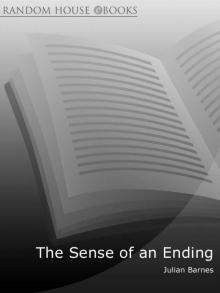 The Sense of an Ending
The Sense of an Ending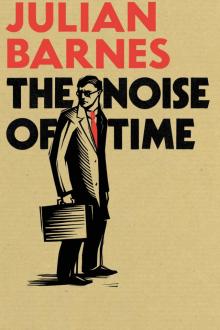 The Noise of Time
The Noise of Time Metroland
Metroland Letters From London
Letters From London Before She Met Me
Before She Met Me Pulse
Pulse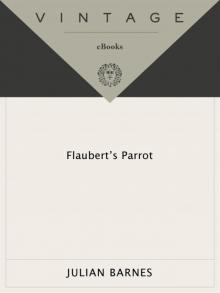 Flaubert's Parrot
Flaubert's Parrot England, England
England, England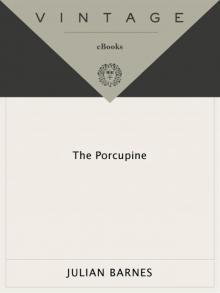 The Porcupine
The Porcupine The Only Story
The Only Story Love, Etc
Love, Etc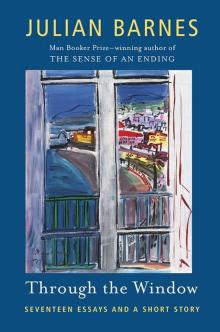 Through the Window: Seventeen Essays and a Short Story
Through the Window: Seventeen Essays and a Short Story Staring at the Sun
Staring at the Sun Cross Channel
Cross Channel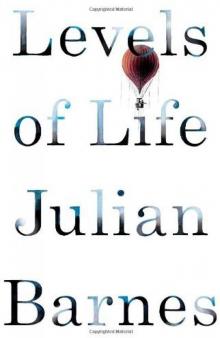 Levels of Life
Levels of Life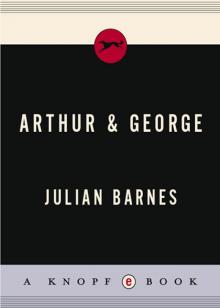 Arthur & George
Arthur & George Love, Etc.
Love, Etc. A History of the World in 10 1/2 Chapters
A History of the World in 10 1/2 Chapters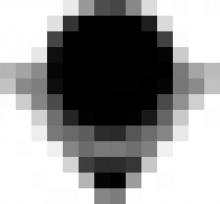 Something to Declare
Something to Declare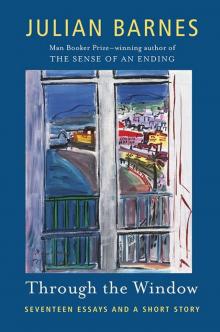 Through the Window: Seventeen Essays and a Short Story (Vintage International)
Through the Window: Seventeen Essays and a Short Story (Vintage International)